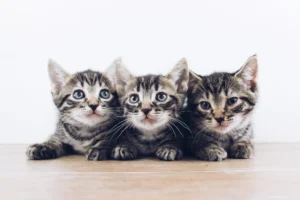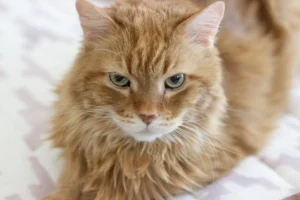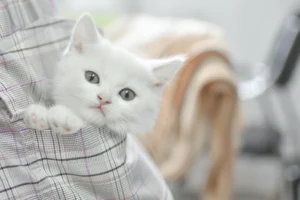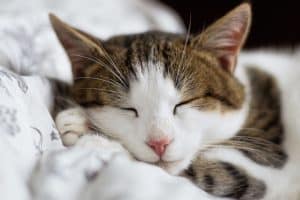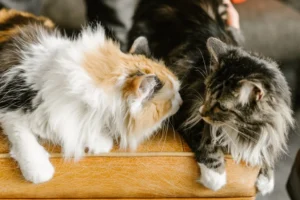Cats are a ubiquitous presence in Greece, seemingly appearing in every nook and cranny of the country. But why are these feline creatures so prevalent in this Mediterranean nation?
They serve as both pest control and beloved companions for the residents of Greece, making them an integral part of the local environment. Let’s explore the reasons behind the widespread presence of cats in Greece.
Historical Significance of Cats in Greece
Cats have played a significant role in Greek culture for centuries, with their presence dating back to ancient times. In ancient Greece, cats were highly revered for their mysterious and independent nature, often associated with goddesses such as Artemis, the goddess of the hunt. Greeks viewed cats as symbols of good fortune and protection, with many believing that they could ward off evil spirits. This deep-rooted admiration for cats has continued through the years, leading to the widespread presence of cats throughout the country.
Climate and Habitat
The warm Mediterranean climate of Greece provides an ideal environment for cats to thrive. With mild winters and hot summers, Greece offers cats ample opportunities to reproduce and establish feral populations. Additionally, Greece’s diverse terrain, including islands, urban areas, and rural landscapes, creates various habitats for cats to inhabit. The abundance of food sources, such as small rodents and insects, further supports the cats in their survival and reproduction.
- Unique Insight: The ancient Greek practice of keeping cats to control pests on ships may have contributed to the spread of cats throughout the Mediterranean region, including Greece. This historical maritime connection played a role in establishing cats as valuable companions and pest controllers in Greek society.
Remember, cats have seamlessly integrated into the fabric of Greek life, becoming a ubiquitous presence in streets, homes, and even ancient ruins. The historical reverence for cats combined with the country’s favorable climate and diverse habitat have all contributed to the pervasive presence of cats in Greece.
Cultural Beliefs and Superstitions
Cats have long been revered in Greek culture, with diverse myths and superstitions surrounding these feline creatures. In ancient Greek mythology, cats were believed to be sacred animals associated with the goddess of wisdom, Athena. It was thought that cats possessed mystical powers and could ward off evil spirits, bringing good luck to those who kept them close.
Even today, many Greeks hold superstitions about cats. It’s a common belief that if a cat sneezes near a bride on her wedding day, it’s a sign of good luck. Additionally, black cats are considered to bring prosperity and abundance to households, while harming a cat is believed to bring bad luck and misfortune.
Their presence in Greek society goes beyond superstitions. Cats are widely embraced for their independent and mysterious nature, embodying characteristics that Greeks admire and respect. This cultural significance has led to the widespread acceptance and proliferation of cats throughout Greece, as they are seen as symbols of protection and good fortune.
Role in Tourism
The enchanting allure of cats has also played a significant role in drawing tourists to Greece. Visitors from around the world are captivated by the sight of cats roaming the picturesque streets and alleyways of Greek towns and islands. These furry feline residents have become an integral part of the country’s charm, adding to its unique cultural tapestry.
Travelers often find joy in interacting with these friendly and photogenic creatures, snapping photos with them against the backdrop of historic ruins or scenic landscapes. Many cafes and restaurants even welcome cats as honorary patrons, further enhancing the overall experience for tourists seeking an authentic taste of Greek culture.
For cat lovers, Greece offers a paradise of adorable and well-cared-for felines, creating memorable moments and lasting connections with these beloved animals. Whether lounging in the sun or playfully exploring their surroundings, cats in Greece have become veritable ambassadors, endearing themselves to visitors and locals alike.
Cat Sanctuaries: Several organizations and individuals in Greece are dedicated to caring for stray cats, providing them with food, shelter, and medical attention. These cat sanctuaries not only help control the population of strays but also offer a compassionate solution for these animals in need.
Cat Merchandise: The popularity of cats in Greece has sparked a market for cat-themed souvenirs and products, ranging from t-shirts and mugs to handmade crafts and artwork. Tourists often seek out these unique items as keepsakes of their memorable encounters with Greek cats.
Cat Festivals: Some cities in Greece celebrate cats with special events and festivals, showcasing the role of cats in Greek culture and honoring their significance. These festive gatherings attract cat enthusiasts and tourists alike, fostering a sense of community and appreciation for these beloved creatures.
Stray Cat Crisis
Did you know that Greece faces a significant challenge when it comes to managing the population of stray cats in urban areas? These cats can be found roaming the streets, parks, and alleys, leading to concerns about public health and animal welfare. The warm climate and abundance of food sources contribute to the high number of stray cats in the country. In addition, cultural attitudes towards cats, which are often considered as semi-wild animals that can fend for themselves, also play a role in the presence of these feline residents.
Efforts to address this issue include trap-neuter-return programs that aim to control the cat population by spaying and neutering strays before releasing them back into their habitat. These programs not only help reduce the number of kittens born on the streets but also improve the overall health and well-being of the existing cat population.
Community Care Initiatives
Despite the challenges posed by the large population of stray cats, there are heartwarming initiatives taken by local communities and organizations in Greece to care for and protect these furry creatures. Volunteer-run shelters provide food, shelter, and medical care for stray cats, offering them a chance at a better life. Additionally, community feeding stations are set up to ensure that stray cats have access to regular meals and clean water.
Through these initiatives, Greeks are working together to show compassion and empathy towards these animals in need. The dedication and care shown by these individuals and organizations help create a more humane environment for the country’s feline residents, promoting coexistence between humans and cats.
Famous Cats in Greek History
Let’s take a walk down the historical streets of Greece and uncover some of the most famous feline friends they’ve had over the years. One notable cat from Greek mythology is the “pure white” cat of Apollo, who was revered as a symbol of cleanliness and spiritual purity.
Another famous feline figure is Aristophanes, the Athenian playwright who had a deep admiration for cats, often incorporating them into his works. His love for these graceful creatures even led him to create a play called The Birds, which featured a chorus of singing cats.
In modern times, Marie, a stray cat from Athens, became a local celebrity for her friendly demeanor and knack for predicting earthquakes. She gained a loyal following among the residents of Athens and was even featured in a documentary about her unique abilities.
These cats, both mythical and real, have left a paw print on Greek history, showcasing the special bond between humans and felines throughout the ages.
Cat-Friendly Legislation
Greece takes the welfare of its feline residents seriously, with a number of laws and regulations in place to protect these beloved animals. One key piece of legislation is Law 4039/2012, which establishes guidelines for the care and treatment of animals in Greece.
Under this law, it is illegal to abandon pets or cause them harm, with strict penalties for those who violate these regulations. Additionally, there are provisions for the identification and registration of cats to ensure their well-being.
Furthermore, Greece has a number of animal welfare organizations, such as the Greek Animal Welfare Fund, that work to promote the humane treatment of animals and provide support for stray cats in need of care.
By enacting these cat-friendly laws and supporting organizations dedicated to animal welfare, Greece is showing its commitment to safeguarding the lives of its furry feline friends.
Unique Feline Behaviors
In Greece, cats hold a special place in the hearts of many locals, and their behavior reflects their adaptability to urban environments. It’s common to see cats lounging in cafes, shops, and even archaeological sites. Greek cats have a reputation for being independent and street-smart, with a knack for finding warm spots to sunbathe during the day and scavenge for food at night. Unlike some cats who are more aloof, Greek cats are often friendly and enjoy human interaction, making them beloved companions in many communities.
One unique behavior of Greek cats is their resourcefulness in finding food. Due to the abundance of outdoor dining and the generosity of locals who leave food and water out for them, Greek cats have honed their scavenging skills to thrive in urban settings. This adaptability has contributed to their widespread presence across the country, as they can survive and even thrive in a variety of environments.
Cat Cafes and Adoption Centers
Cat cafes and adoption centers have been gaining popularity in Greece as a way to promote the well-being of stray cats and encourage responsible pet ownership. These establishments provide a cozy environment for visitors to enjoy a cup of coffee while interacting with friendly felines, some of whom are available for adoption. By bringing cats into public spaces, these cafes and centers help raise awareness about the importance of caring for and providing homes for stray cats.
Visiting a cat cafe or adoption center is not only a great way to relax and de-stress, but it also allows you to support local efforts to improve the lives of Greek cats. Many of these establishments collaborate with animal welfare organizations to provide medical care, food, and shelter for stray cats, helping to reduce the population of homeless felines in the community. If you’re a cat lover looking to make a positive impact, consider visiting a cat cafe or adoption center in Greece to show your support for these lovable creatures.
Ecological Impact of Cats
In Greece, cats have a significant ecological role in controlling pest populations like rodents and insects, helping to maintain a balance in the ecosystem. Their presence is crucial in preventing these pests from overwhelming agricultural fields and spreading diseases. By keeping these populations in check, cats indirectly contribute to the overall health of the environment and human populations.
While it’s essential to acknowledge the impact of cats on local wildlife, especially endangered species, it’s equally important to recognize their value in maintaining a stable ecosystem. Finding a balance that allows cats to continue their pest control duties while minimizing harm to wildlife is key to preserving the unique ecological landscape of Greece.
Fun Facts about Greek Cats
- Greek cats have a strong cultural significance and are often viewed as symbols of good luck.
- Cats in Greece are known for their friendliness and are often seen socializing with locals and tourists alike.
- Many traditional Greek villages have designated “cat ladies” who care for and feed the local feline population.
- Greek cats are skilled hunters and are adept at catching mice and other small pests.
- Tourists visiting Greece often take delight in the friendly and photogenic cats that can be found lounging in sunny spots or chasing each other through narrow alleyways.
Next time you visit Greece, don’t be surprised to find cats lounging on ancient ruins or strolling along picturesque beaches. Their presence adds a touch of charm to the Greek landscape and offers a unique glimpse into the country’s rich cultural tapestry.
Alex, a passionate animal lover, has experience in training and understanding animal behavior. As a proud pet parent to two dogs and three cats, he founded AnimalReport.net to share insights from animal experts and expand his knowledge of the animal kingdom.


